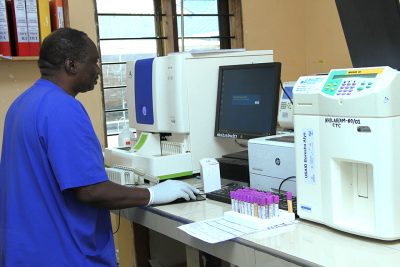+255 745 510 619
info@nhr.or.tz
Mon - Fri: 9.00am - 11.00pm
 The Diagnostic Laboratory Department comprises 6 units namely: Histopathology, Microbiology, Parasitology, Hematology and Blood Transfusion, Clinical Chemistry, and Mortuary.
The Diagnostic Laboratory Department comprises 6 units namely: Histopathology, Microbiology, Parasitology, Hematology and Blood Transfusion, Clinical Chemistry, and Mortuary.
All units in this department are computerized and results are posted in the Jeeva System for clinicians to view online in the wards or clinics. To ensure efficiency in reports dispatch, the department uses a laboratory information system (LIS) that is interfaced with all analyzers and the hospital information management system (HIMS), the Jeeva System.
Histopathology and Cytopathology Unit
The unit has both, modern automated tissue processing and tissue staining machines which, in conjunction with best management practices, produce quality results for biopsies. Cytology samples processed and reported such as Pap smears, Fine Needle Aspiration (FNA), fluid Cytology, Exfoliative Cytology samples, Buccal smears for Barr bodies, and Seminal fluid analysis for infertility investigations. This unit also performs immunohistochemical and special stains on tissue biopsies.
Parasitology Unit
This unit is responsible for the diagnosis of most parasitic organisms in urine, stool, and blood. For malaria diagnosis both rapid and conventional test methods are applied. Other tests done in this unit include Bence Jones proteins and Occult blood in stool.
Microbiology Unit
This unit has the latest MGIT- 960 TB System and BactAlert 3D blood culture system. Due to the considerably high number of results involved here, the Laboratory information system has become handy in ensuring timely results capture for both internal and external clients.
Some specialized tests in this section include:-
Highly sensitive bacterial identification system to species level. Antibiotic susceptibility testing using quantitative results in MIC values (E-test method). Serological tests employ highly sensitive kits aimed at target decision-making by clinicians.
Molecular section of the Microbiology Unit.
The section is responsible for advanced molecular biology DNA/RNA tests for HIV. It is equipped with state of Art ABS Themacy 9700. Some of the routinely done tests include HIV Viral load, Hepatitis B Virus antigen, Hepatitis C Virus antibody, and PCR DNA test to detect HIV infection in infants below 18 months of age born to HIV-infected mothers. Other serological tests done in this unit include Rubella serology, Toxoplasma serology and IgG, Anti – Streptolysin O Titer (ASOT), and Rheumatoid Factor.
Hematology and Blood Transfusion Unit.
The hematology unit is responsible for analyzing samples of patients requested by clinicians such as full blood picture (FBP) in anemic patients to find out the cause of anemia, Erythrocyte Segmentation Rate (ESR), and other tests for blood-related diseases including blood cancers whereas blood Transfusion Unit deals with pre and post donation counseling of blood donors. The section also deals with screening of all internally donated blood for HIV, Hepatitis B and C, and Syphilis from relatives of patients who are to undergo elective operations in the hospital.
Furthermore, this section is the one responsible for issuing safe and screened blood to all patients in need of blood within the hospital. The Hematology Unit is equipped with four main analyzers which also relay reports directly to the hospital information system. The unit has state-of-the-art equipment which includes; cell Dyne 3500, Cell Dyne 3700, Celltac Hematology analyzers, Facscount, and the ACL Coagulation equipment. Other than routine tests in hematology and blood transfusion, this laboratory has strengths in analyzing coagulation studies for Factor VIII, Factor IX, Lupus Anticoagulant, Hb – electrophoresis, Prothrombin Time (PT), Partial Prothrombin Time, Bone Marrow Aspiration smears and trephine biopsies as it is manned by highly qualified hematologists.
Clinical Chemistry Unit.
This unit has fully automated machines including one State of Art Architec 8000 machine, and a double (combined) State of Art Architec 4100 machine that is capable of analyzing both immunological and hormonal assays, metabolic tests cardiac enzymes Each of these machines has the capability of testing 1,200 samples per hour. Both machines are interfaced with the Jeeva System and results are viewed immediately online by clinicians
Mortuary Unit.
This unit has_____ modern fridges which can preserve _________ bodies at a time. This unit has highly qualified pathologists who conduct medical, legal, and clinical autopsies accompanied by timely reports of the same.